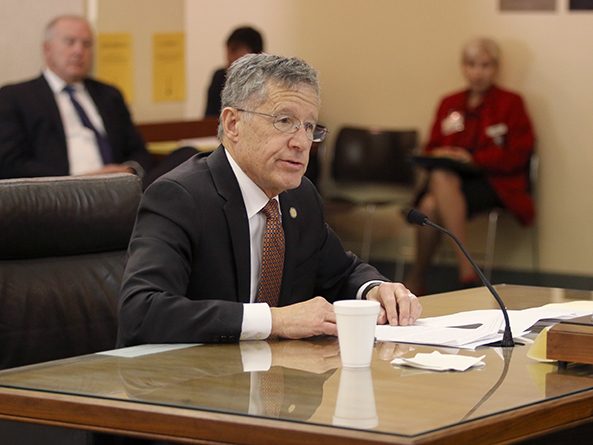Bill would end high-cost calls for inmates
Members of the Judiciary Committee heard testimony Jan. 18 on a bill that would preserve an inmate’s communication access.

LB776, introduced by Omaha Sen. John McCollister, would require county and city jails to provide inmates with affordable communication by telephone or videoconferencing with their families and legal counsel.
Under the bill, each jail could establish a prepaid or collect telephone system, or a combination of both. Inmates’ family members could deposit money into a prepaid account with the third-party provider of telephone services to cover the cost of the call. Any company contracted by a jail to provide such services would be prohibited from charging excessive service rates or commissions.
McCollister said research has shown that regular contact between inmates and their families and attorneys leads to lower rates of recidivism upon release.
“Maintaining contact with parents, spouses and children strengthens an offender’s chances of being rehabilitated and improves outcomes for the children left at home,” he said.
Nearly one in 10 Nebraska children are impacted by parental incarceration, said Voices for Children Policy Director Julia Tse in support of the bill.
“The loss of one parent to incarceration often sets off a domino effect of other issues, including a loss of income and a key figure in the child’s life,” she said. “We cannot undo the trauma [incarceration] inflicts on children, but we can do our best to limit the damage.”
The bill would ensure phone calls or video conference sessions between an inmate and an attorney are free of charge. Monitoring or recording of such communication would be prohibited.
Public Defender Ben Murray spoke in support of the bill. He said 59 phone calls between him and his client were improperly recorded and shared with the prosecution. Establishing trust already is difficult, Murray said, but it is almost impossible to do when jails record calls between an attorney and a client.
“These clients are up against a [legal] system that is so stacked against them, with prosecutors who overcharge them in nearly every single case in order to pressure them into plea agreements and asked to post bonds they cannot afford,” he said. “The least we could do is give them unfettered access to phone calls.”
Juneal Pratt, formerly incarcerated, also supported LB776. Maintaining a connection to the community is imperative to easing an inmate’s post-release transition, he said.
“These bills always come in under the auspice that [the Legislature] is trying to make it nicer for the inmate, but this is about protecting the public,” Pratt said. “When I come back to the community, the more I’m able to adjust to my surroundings, the safer everyone is.”
Speaking in opposition to the bill, Douglas County Corrections Director Mark Foxall said his agency would experience a loss of $616,000 annually. The loss of revenue would negatively impact the ability of Corrections to provide programming to inmates, including job and life-skills training, GED testing and job-readiness training.
“Our inability to serve the programming needs of our inmates could impact the population of the state Correctional System due to recidivism,” he said.
The committee took no immediate action on the bill.


